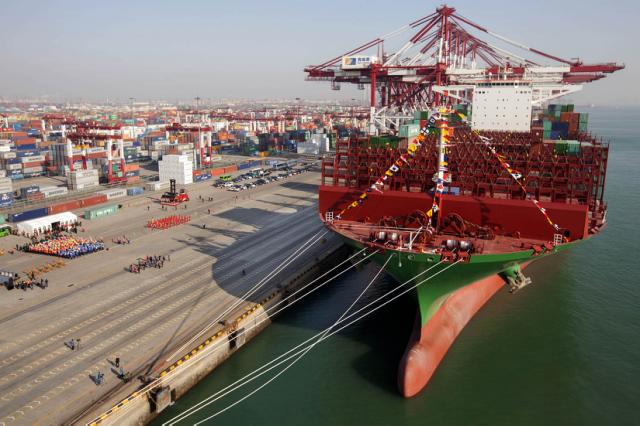Media Report

- The Associated Press reports: "China's trade growth rebounded in May in a positive sign for global demand and the cooling Chinese economy. Exports rose by a better-than-expected 8.7 percent over a year earlier to $190 billion, up from April's 8 percent growth, customs data showed Thursday. Imports gained 14.8 percent to $150.2 billion, up from the previous month's 11.9 percent. Unexpectedly strong exports could lend support to economic growth that is forecast to weaken this year as Beijing tightens credit controls to reduce the risks of rising debt. The data show 'momentum in demand from the U.S. and the EU continues to improve,' said Louis Kuijs of Oxford Economics in a report. Chinese leaders are trying to steer the country to self-sustaining growth based on domestic consumption and reduce reliance on trade and investment but want to avoid politically dangerous job losses in export-dependent industries.Forecasters warned Chinese import demand is likely to wane as the economy cools. The International Monetary Fund expects this year's economic growth to decline to 6.6 percent from last year's 6.7 percent and to below 6.2 percent in 2018. 'The current strength of imports is unlikely to be sustained if, as we expect, slower credit growth feeds through into weaker economic activity in the coming quarters,' said Julian Evans-Pritchard of Capital Economics in a report."
- Reuters reports: "China reiterated its opposition on Thursday to the U.S. deployment of an anti-missile system in South Korea, after Seoul said it would hold off on installing remaining components until it completes an assessment of the system's environmental impact. The move could mean substantial delays in a full deployment of the Terminal High Altitude Area Defense (THAAD) system in South Korea, as the environmental review may take well over a year, according to a senior official at the presidential Blue House...On Wednesday, Moon's office said installation of four additional launchers would be halted until an assessment of the system's impact on the environment was completed...Speaking at a daily news briefing, Chinese Foreign Ministry spokeswoman Hua Chunying reiterated that China's opposition to the deployment of THAAD was clear and consistent. 'We have said many times before that the United States deployment of THAAD not only is not beneficial for the resolution of the Korean Peninsula nuclear issue, it is also not good for regional stability,' she said."
- The Wall Street Journal comments: "Across the Pacific islands, a quiet but determined chess game is being played for control of the region. Only one side, however, is competing in earnest. The other appears to be ceding ground without much of a fight. This is a new phenomenon. For more than 100 years, the U.S. has viewed the Pacific Ocean as an 'American lake.' But recently much has changed. The Philippines, long an American ally, has pivoted away to China, while the rest of the Pacific islands are also being wooed with Chinese diplomacy and investment. The U.S., meanwhile, has remained absent. Former President Obama's 'pivot to Asia' has proved to be empty rhetoric. Today there is little evidence that the U.S. is putting any significant resources into the Pacific islands. President Trump has an opportunity to do something substantial here, but his office may be distracted by the Middle East, as has been the case with every prior administration. For the price of a single day's war in the Middle East, the U.S. could shore up its Western flank by courting the Pacific islands with investments in tourism and vital infrastructure while engaging meaningfully with its leaders. Instead, China is picking them off one by one."
Calendar
- 2017-06-07 China Criticizes Pentagon Report, Laments U.S. ‘Cold War Mentality’
- 2017-06-06 California, China defy U.S. climate retreat with new cleantech tie-up
- 2017-06-05 Turning Against Trump: How the Chinese Covered the Climate Pact Exit
- 2017-06-04 On Climate, China Should Think Small
- 2017-06-02 Trump Hands the Chinese a Gift: The Chance for Global Leadership
- 2017-06-01 As U.S. retreats, EU and China seek climate leadership at summit
- 2017-05-31 China Gauge of Factory Activity Holds Steady in May
- 2017-05-30 A wild ride awaits Branstad in China
- 2017-05-26 China's reforms not enough to arrest mounting debt: Moody's
- 2017-05-26 China's reforms not enough to arrest mounting debt: Moody's
News
- The Associated Press China's trade growth rebounds in May
- Reuters China reiterates opposition to anti-missile system despite delay
- The Associated Press In Beijing, Perry promotes US-China clean energy cooperation
- Reuters California, Tsinghua to set up U.S.-China climate change institute
- USA Today Russia's boost in trade with North Korea worries U.S.
- The Financial Times ShoreVest Capital taps into growing global interest in China NPLs
- Bloomberg China Buys Kazakhstan Lender as Xi Pushes Trade 'Belt and Road'
- The Wall Street Journal Perpetual Doesn't Mean Forever in China
- Bloomberg Is China in Lock-Step With the Fed? Keep Watch Next Week
- Reuters U.S. business group urges trade fixes ahead of China's party congress
- The Washington Post Ivanka Trump's brand distances itself from China shoemaker
- The Financial Times Smile to enter: China embraces facial-recognition technology
- The New York Times Alibaba Predicts Strong Sales in a Sign of Strength From China
Commentary
- The Wall Street Journal: Opinions The U.S. Is Losing the Pacific to China
- Business Insider China rejected US requests to release 3 activists detained while investigating Ivanka Trump's shoe supplier
- Forbes Vietnam Is Losing Economic Ground To China Due To Lack Of High-Skilled Workers
- Foreign Policy How SpaceX Launched a Chinese Experiment Into Space, Despite U.S. Ban
- Barron's 3 Opinions On China As Reserves & Equities Rise
- Fortune Can Tesla Succeed in China?
- Quartz The Chinese government just issued a new set of rules for foreign students studying in China
